When choosing between the Salkantay Trek vs Inca Trail, be prepared to make some hard decisions as both hikes are beautiful and memorable, yet each offers a unique experience.
The Inca Trail is one of the world’s most popular treks, letting you walk in the footsteps of ancient civilizations. The Salkantay Trek, however, is slightly longer and off the beaten track, with around 72% less foot traffic when compared to the Classic 4-Day Inca Trail.
This guide will review the Salkantay Trek as an alternative to the famous Inca Trail. This should help you decide which is the best option for you, based on your hiking goals and style, personal preferences and budget.
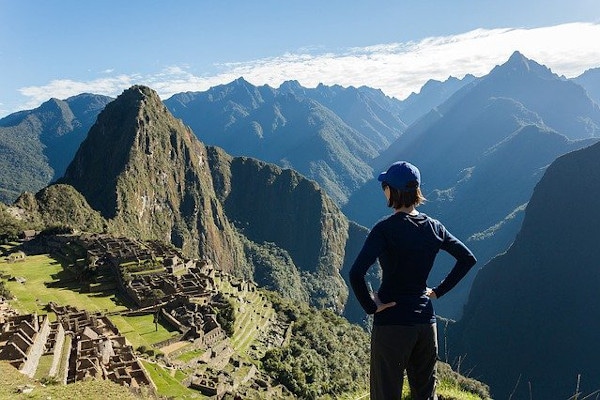
Get a Machu Picchu trek quote
Start planning your Machu Picchu hiking holiday.
What are the Main Differences Between the Salkantay Trek vs Inca Trail?
Routes and Difficulty
Both routes reach altitudes over 4,000 m (13,000 ft) and require a good level of fitness. Do not underestimate the importance of spending a few days acclimatising to the altitude beforehand, particularly in mountainous cities like Cusco.
Salkantay Trek: Moderate-Strenuous
The Salkantay Trek is a longer route - traversing over steep and more difficult terrain, and can take over 5 days. Salkantay is definitely the better choice for magnificent views of the Andes and some great wildlife sightings. Tour groups usually start at Soraypampa, hiking 46 miles (74 kilometres) through breathtaking mountain scenery, past Humantay Lake.
The highest point on the Salkantay trek is 4630m (1,5190 ft) and this is 200 metres (656 feet) higher than the highest point on the Inca Trail.
Please Note: Similarly to a lot of other alternative treks, the Salkantay Trek does not end directly at Machu Picchu. Before finishing your trek, you will be transported to the Hidroeléctrica Station, where you will either hike for another 2-3 hours to the town of Aguas Calientes. Hikers can also use this opportunity to enjoy a magnificent train ride with windows projecting amazing vistas and mountain tops. The train to Machu Picchu costs vary depending on your preference, so check the prices and book early.
Inca Trail: Fair
This is one of the world’s most famous hikes with ancient ruins from the Incan Empire, scattered along the historic route from Cusco to Machu Picchu.
The route begins in the Sacred Valley in the town of Piscacucho (also known as Km 82 in Perú). The Inca trail is half the length of the Salkantay Trek with 26 miles (46km) of fairly moderate hiking trails trekked over 4 days (see: how long is the Inca trail to Machu Picchu). Hikers reach a maximum altitude of 13,828 feet (4,215 m). However, partially thanks to being the shorter trail, this is the only route ending directly in the stone city of Machu Picchu.

Get a Machu Picchu trek quote
Start planning your Machu Picchu hiking holiday.
Comparing the Salkantay Trek vs Inca Trail
When comparing the Salkantay Trek vs Inca Trail, the key differences are:
- Cost and Availability
- Guides and Porters
- Accommodation and Facilities
Before I discuss these aspects in greater detail below, here is a handy spreadsheet outlining the main features of both the Salkantay Trek and Inca Trail:
Salkantay Trek | Inca Trail | |
|---|---|---|
Distance | 46 miles (74 km) | 26 miles (41km) |
Average per Day | 7.5miles (12 km) | 7 miles (11 km) |
Most Difficult Day | Day 2- Salkantay pass | Day 2- Dead Woman’s Pass |
Other Options | Can be done in 4 days if you skip Humantay Lagoon | 2-day short trek available |
Trail Closed | No, but some operators close February-March | February |
Risk of Altitude Sickness | Higher, especially on nights 1 and 2 sleeping above 3,800m | Lower altitude but more time above 3,000m |
Cost and Availability
Salkantay Trek Costs
This trek will cost you about $400-$900 (depending on which tour operator you choose). While there is no permit necessary to hike Salkantay, there is an entrance fee for Machu Picchu and a train ride back to Cusco. Ensure that your package fee is all-inclusive or potentially risk numerous added expenses. The trek is less touristy, so there is no cap on the number of hikers. This is why it is open to all and usually available at the last minute, even when booking for larger groups.
Inca Trail Costs
The Inca Trail cost is roughly 25-35% more expensive than the Salkantay trek, which is between $600 and $1,000. As this is one of the world’s most popular hikes, you must book 6-12 months in advance. Early planning is especially important if you want to hike during peak season (May-August).
Pro Tip: The best time to hike the Inca Trail is mid-December when passes are being issued for the following year.
Only 500 people are allowed on the Inca trail each day, including guides, chefs and porters. Keep in mind that only 200-250 permits are issued daily for tourists. The limited availability makes this trail more expensive. Group sizes are limited to 16 with two tour guides or one guide for every 8 guests.
See more on Inca Trail Availability And Permits.
Guides and Porters
Salkantay Trek Guides and Porters
Treks in the Andes change frequently due to the governmental road building which often includes controlled micro dynamite explosions. So, only experienced guides will be able to take you around an unexpected closure on any part of the trail.
This is why guided treks are generally preferred by most international travellers. One of the biggest differences between the Salkantay Trek and the Inca Trail is that the former can be hiked unguided (see hiking the Salkantay without a guide). This means that you’ll pay a bit less for accommodation or camping and carry your own gear and food.
Inca Trail Guides and Porters
The Inca trail can only be hiked with permits and a licensed guide, as part of an organised tour. Be sure to book a tour that includes porters or you may have to hire one separately. Porters carry luggage of up to 15 lb. per person, which means you can walk more comfortably and carry only what you need for the day.
Read our guide on the art of tipping porters on Machu Picchu.
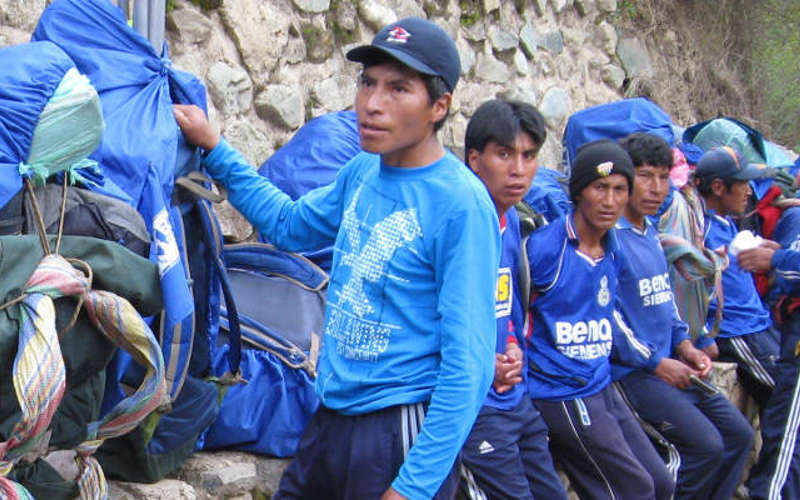
Accommodation and Facilities
Salkantay Trek Accommodation
Campsites are not strictly regulated along the Salkantay trail, so your trekking team can choose wherever they think is best to set up more secluded campsites. Depending on your tour, you might need to get acquainted with wood-toilets and ice-cold stream bathing! There is an option to hike from lodge to lodge if you can’t go without hot showers and a real bed. Mind you, it's not as comfortable as it sounds, but is definitely a better option if you’re looking for some creature comforts on this strenuous trek. You can also make bookings to stay in unique glass tents on the first night, which is perfect for stargazing. On the last night, hikers have a choice of hotels in Aguas Calientes.
Inca Trail Accommodation
The accommodation offered along the Inca trail is mostly government-design campsites. These camps accommodate large numbers of hikers which can mean overcrowded spaces and limited bathroom facilities. For those who want a bit more space and privacy, there is a significantly more comfortable glamping option (see luxury Inca trail hikes), with privately set up bathrooms and gourmet meals. Keep in mind that one or two squat toilet blocks are provided along the trail, but otherwise, you will need to wait to use the allotted Inca Trail toilets for when you get to your campsite.
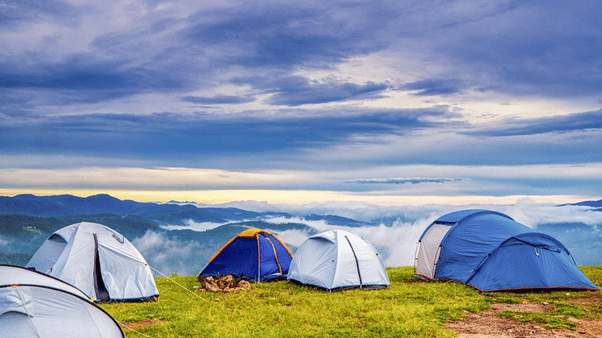
Salkantay Trek Highlights
Depending on your guide, you may have the option of zip lining, visiting a coffee farm or enjoying the natural hot springs along the Salkantay trail.
Who Should Hike The Salkantay Trek?
The Salkantay trek is for the more experienced, adventurous travellers who are up for more challenging mountain passes. If you are a nature-lover who values solitude and is hoping to see wildlife or capture beautiful landscapes without many other hikers in sight, this trail will not disappoint.
Feeling spontaneous or forgot to make a booking? The Salkantay Trek is usually available at the last minute.
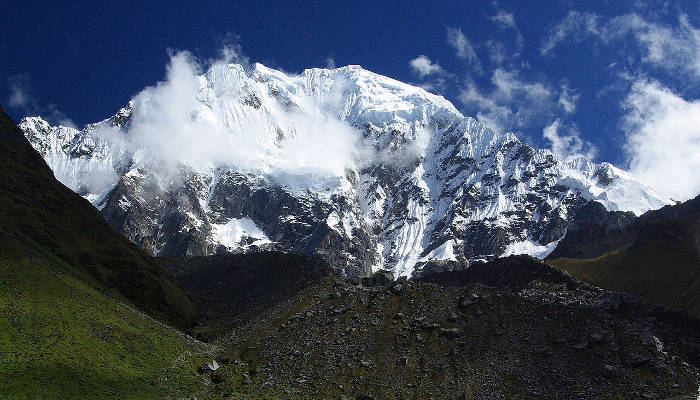
South-west face of Nevada Salkantay, as viewed from the Salkantay trail.
Untamed Natural Scenery
The Salkantay trail has arguably better scenery than the Inca trail, reaching higher points and more remote mountain wildernesses. The trail runs around the beautiful, glacier-covered Mount Salkantay (also known as 'Savage Mountain'), an imposing peak that dominates your view for the first part of the hike.
The magnificent turquoise Humantay Lake is a true highlight and you can expect plenty of wide-open mountain views before heading down into the warm ancient jungle habitat.
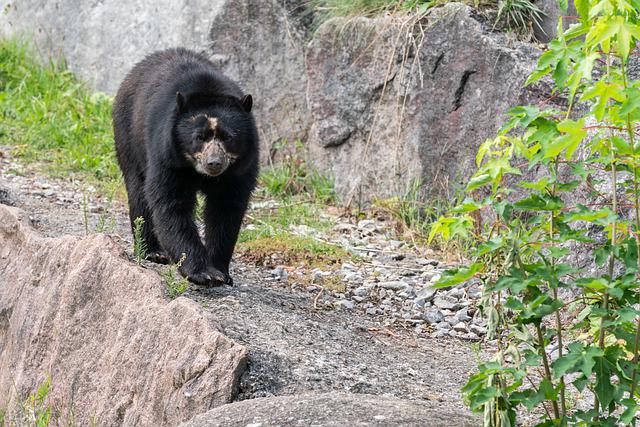
Wildlife
Fewer people on the trail means a much better opportunity for animal sightings, including spectacled bears, deer and adorable chinchillas.
Cloud Forests and Warm Weather
Only two of the 5 days will be spent above 3,000m (9,843 ft). For the rest of the trek, you will enjoy warm weather in the cloud forests.
Llactapata Ruins
Although the Salkantay Trek does not pass as many ruins as the Inca trail, you will still get to see the archaeological site of Llactapata. You can stop at these ruins, nestled on the mountain top facing Machu Picchu, before your descent into Aguas Calientes.
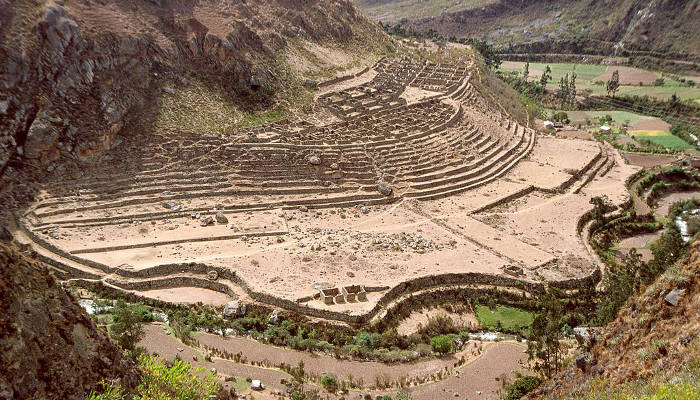
Llactapata, an impressive Inca ruin discovered by Hiram Bingham in 1911.
Overview of Inca Trail
Who Should Hike The Inca Trail?
If you love history and culture, I suggest you follow the historic route of the Inca Trail. Not only will you be able to book your holiday well in advance, but you will also see countless historical ruins, making this the ideal trail for you. The Inca trail only requires moderate fitness but can become busy, so this hike is for those who don’t mind sharing the trail.
Ancient Incan Ruins
The Inca trail is so named as it follows the original route of the ancient Incan people on their journey to Machu Picchu. You can expect to pass through the remains of Patallaqta, Sayacmarca, Runcurracay and Phuyupatamarca and the stone terraces of Wiñay Wayna. These are just some of the iconic features on this trail. If you want more information, knowledgeable guides can take you back in time to explore the culture and history of the Incas.
Daybreak At The Sun Gate
Your hike comes to an end at daybreak as you wake up before the sun to get early access and pass through the Sun Gate (Inti Punku) into the stone city of Machu Picchu. A fitting reward after 4 days of hiking!
Notable Mountain Climbs
There are two notable climbs along the Inca Trail. The highest is the Dead Woman’s Pass (4,215 m / 13829 ft) which should take around 6 hours to climb up and 2 hours to descend. The second is the Runkurakay Pass, which takes around 4 hours up and down, reaching 4,000 m / 13,123 ft.
Meet New People
With hundreds of people on the trail on any given day, you are likely to encounter other hikers en route. The busier trail offers the opportunity to chat with like-minded hikers while you catch your breath or enjoy the views along the way.
Pro Tip: Some sections of the trail are located along narrow or steep pathways, so it may be a little intimidating if you don’t have a head for heights!
Choose The Sections You Will Trek
There is some flexibility when deciding which part of the trail you want to hike. The full hike is 4 days whereas a short 2-day Inca Trail option gives you access to some of the popular ruins. This is ideal for hikers with limited time or who don’t want to commit to the full hike.

Get a Machu Picchu trek quote
Start planning your Machu Picchu hiking holiday.
Conclusion
Based on my review, I can confidently say that the Inca trail is the right choice if you want to see as many historical ruins as possible and claim bragging rights to completing one of the most popular treks on the planet.
With that said, if you prefer nature and open landscapes or simply want a more challenging hike, I highly recommend the Salkantay trek. Either way, prepare for an experience of a lifetime!

Great article thanks, I was set on the Inca trail but reading this I am a little split for choice. I like the idea of the quieter trail more my thing, but I think your last paragraph sums it up, the Inca trail is Iconic so I guess I will be booking that or I could do both back to back 🙂
Great comparison of the Salkantay Trek and Inca Trail! I’ve been torn between the two for my trip to Peru. The detail on the scenery and difficulty levels really helped clarify my options. I’m leaning towards the Salkantay Trek for the stunning views and less crowded experience. Thanks for the insights!
Great comparison! I’ve always been torn between choosing the Salkantay Trek and the Inca Trail. The insights on the scenery and the experience of each hike really helped clarify my decision. I appreciate the tips on trail difficulty too!
We’re glad you found this article helpful! Hopefully you get to experience this region for yourself soon!